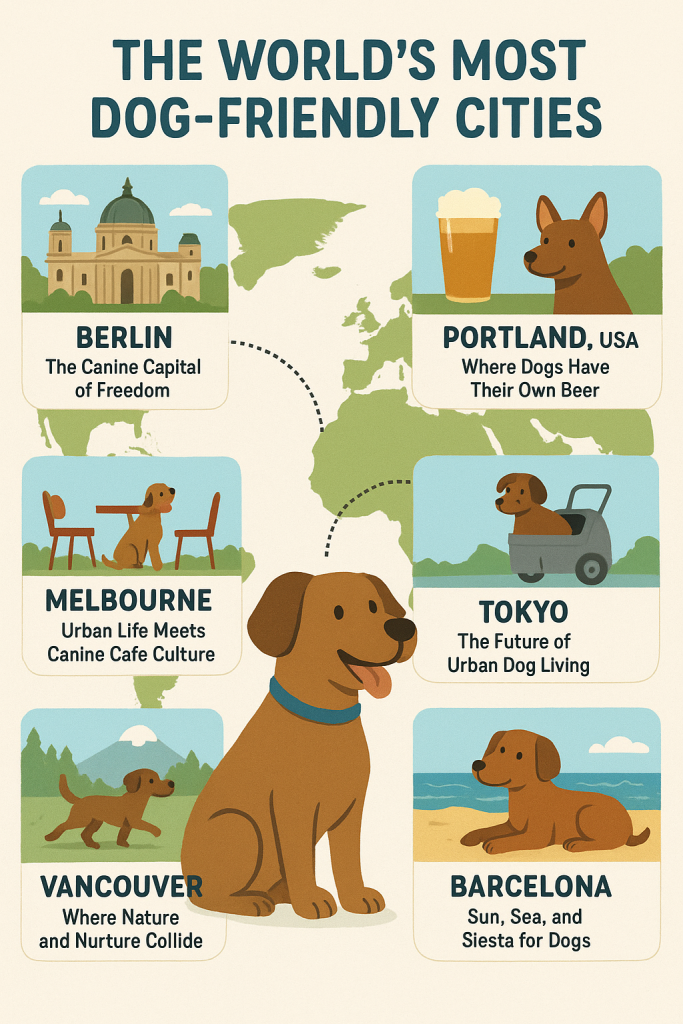In an age where dogs are more than pets—they’re family—some cities are going above and beyond to make life better for both humans and their four-legged companions. But what truly makes a city “dog-friendly”? It’s more than parks and pet stores. It’s about social attitude, public policy, and even canine culture. Let’s take a tour of the world’s most paw-some urban havens for dogs—and see what makes them bark with joy.

🐾 1. Berlin, Germany: The Canine Capital of Freedom
In Berlin, dogs are citizens in spirit. They’re allowed on buses, subways, and even inside many restaurants and stores. Leashes are optional in most green spaces, and “Hundespielplätze” (dog playgrounds) are sprinkled across the city. The culture itself is relaxed and respectful—dogs here learn to behave as well as their owners.
What makes it unique: The government’s trust in responsible ownership. Berlin’s dogs don’t need constant restriction because social etiquette is ingrained in both species.
🌳 2. Portland, USA: Where Dogs Have Their Own Beer
Portland isn’t just weird—it’s wonderfully dog-centric. With more dog parks per capita than any other U.S. city and countless pet-friendly cafes, dogs here live their best lives. Some breweries even offer “dog beer”—non-alcoholic brews made with beef broth.
What makes it unique: A playful, creative culture that treats dogs as part of the city’s quirky identity.
☕ 3. Melbourne, Australia: Urban Life Meets Canine Café Culture
Australia’s cultural capital is a paradise for sociable dogs. Outdoor dining is common, and most cafes offer “puppuccinos” (foamed milk cups for dogs). The city’s beaches—like Brighton Dog Beach—let pups run free with the skyline in view.
What makes it unique: A café culture that naturally integrates dogs into daily social life—without treating it as a novelty.
🐶 4. Tokyo, Japan: The Future of Urban Dog Living
Tokyo may be famous for its tiny apartments, but it’s also redefining high-tech pet care. From automated dog spas to capsule hotels offering dog suites, Tokyo blends convenience with affection. Even subways allow small dogs in carriers, and stylish pet fashion is practically an art form.
What makes it unique: Technological innovation meets deep emotional bonding—dogs here live like tiny celebrities.
🌆 5. Amsterdam, Netherlands: Freedom on Four Legs
Amsterdam’s love for cycling extends to dogs—many ride along in cargo bikes, ears flapping in the wind. Dogs are welcome almost everywhere, including many offices. Stray dogs? Practically nonexistent. The Netherlands was one of the first countries to achieve “zero stray” status.
What makes it unique: A humane, system-wide approach to animal welfare that balances freedom with care.
🌿 6. Vancouver, Canada: Where Nature and Nurture Collide
From beaches to mountains, Vancouver gives dogs a life of adventure. The city’s eco-consciousness also extends to pets—many businesses use biodegradable dog waste bags and organic treats. It’s not just pet-friendly; it’s planet-friendly.
What makes it unique: Sustainability and pet culture go hand in paw.
🏖️ 7. Barcelona, Spain: Sun, Sea, and Siesta for Dogs
Barcelona’s Mediterranean vibe extends to its dogs. They can stroll on designated beaches, enjoy water fountains designed at dog height, and dine al fresco with their owners. The city even runs awareness campaigns about dog adoption and etiquette.
What makes it unique: A fusion of leisure, sun, and civic kindness—a true “canine cosmopolitanism.”
🌍 Beyond the Parks: The Science of a Dog-Friendly Society
Urban planners are beginning to study how dogs shape city design. Studies show that neighborhoods with more visible dog-walking tend to have stronger community bonds and lower crime rates. In other words, dogs aren’t just good company—they’re quiet urban architects of connection and trust.
🐾 Final Thought
A dog-friendly city isn’t defined by luxury—it’s defined by empathy. Whether it’s Tokyo’s futuristic care pods or Amsterdam’s open parks, the best cities for dogs are also the best for people. Because when a city learns to welcome its most loyal residents, it learns to be a kinder place for everyone.
